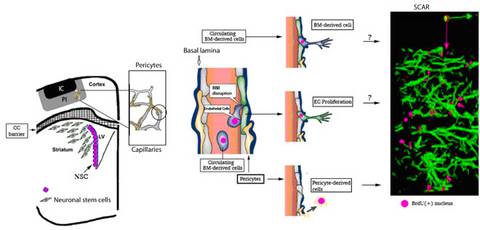Objectives:
The objective of this work package is to improve S&T experience and knowledge of researchers in molecular and cellular neuroscience by advanced demonstrative training studies concerning the acquired equipment at the Brain Research Institute (BRI), Zürich, Switzerland and exchange of know-how and experience with the scientific experts from there.
Laboratory of Molecular Neurobiology
The Laboratory of Molecular Neurobiology is an entity devoted to research and development that is located in the Clinic of Neurology of the Ernst Moritz Arndt University in Greifswald.
The goal of regenerative medicine is to restore cells, tissues and structures that are lost or damaged after disease, injury or ageing in humans. The overall objectives of the studies in this work programme are to study the molecular and cellular reactions to injury in those (mammalian) systems which do not classically regenerate and to ask whether the early events following injury evoke inhibitory responses and/or characteristic responses in stem cells which can be traced by monitoring the transcriptome and proteome profiles.
Despite the presence of endogenous stem cells several mammalian organs do not show any regenerative ability following damage and these include the heart, the CNS and the skin which undergoes scarring following wound healing. In the mammalian CNS, for example, only two restricted areas generate neurons post-natally, the subventricular zone (SVZ) of the lateral ventricle wall and the dentate gyrus subgranular zone (SGZ) of the hippocampus. As a result of inhibitory factors aged rats recover poorly after injuries which results in injury-induced scarring at the border between the periinfarct zone and the infarct core. Recent studies have shown that the tissue scarring results from the action of scar-specific astrocytes (Fig. 1).

- Cellular proliferation after stroke. Hypothetical drawing of proliferating cells migration in the infracted area.
The specific aims of our group are to (i) uncover cellular and molecular mechanisms underlying neurorehabilitation after stroke in aged rats, (ii) examine the role of adult brain neurogenesis for tissue repair after injuries, (iii) investigate possibilities to positively influence/augment adult neurogenesis from stem cells and therefore improve neurorehabilitation after tissue damage in the CNS. Toward this goal advanced techniques, like confocal microscopy in combination with behavioral and cell biological methods will be established in collaboration with the strategic partners. Further, transgenic mice conditionally expressing relevant genes for regeneration will be studied to elucidate cellular and molecular mechanisms underlying recuperation after stroke in aged organisms. The research should translate into new therapeutic approaches for stroke.
Description of the key personnel to be involved in the project:
Prof. Dr. A. Hamm [Psychologist]
Expertise: behavioral recuperation
Prof. Dr. C. Kessler [Neurologist]
Expertise: clinical significance of molecular data
Dr. Ana-Maria Buga [PostDoc]
Expertise: Genomics
Dr. Senthil Kumar [PostDoc ]
Expertise: Behavior; proteomics
Strategic partners:
Prof. Dr. Zaal Kokaia
Laboratory of Neural Stem Cell Biology, University of Lund (UL), Sweden
Dr. Olivier Raineteau
Brain Research Institute (BRI), Zürich, Switzerland
Recent publications related to the project:
- Junker H, Suofu Y, Venz S, Sascau M, Herndon JG, Kessler C, Walther R A (2007). Proteomic identification of an upregulated isoform of Annexin A3 in the rat brain following reversible cerebral ischemia. Glia 55: 1630-1637.
- Buga AM, Sascau M, Pisoschi C, Herndon JG, Kessler C A (2008) The genomic response of the ipsilateral and contralateral cortex to stroke in aged rats J Cell Mol Med 12:2731-2753.
